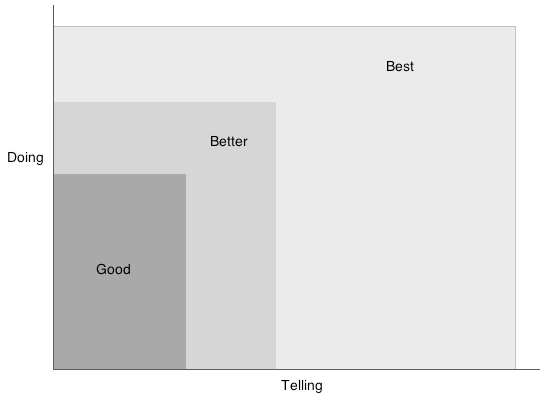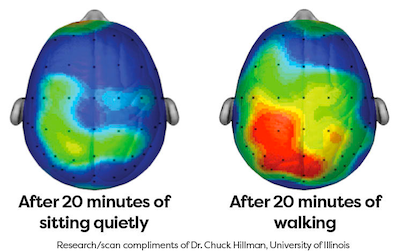These are the ideas that have changed my life.
I think about them daily and they’ve come from some of the smartest minds on the planet. I’ll save you at least 50+ hours by giving you these ideas so you don’t need to stumble across them yourself.
A concept I see no one talking about: Open Loops
Until recently I’d never seen this mentioned.
Open loops are a huge problem. Expert Stephen Timoney describes them as anything that takes your attention off your 1–3 priorities.
These open loops sit outside of your to-do list. They eat away at your attention like parasites on a dead body. They sabotage you. The subconscious mind feasts on these open loops.
Here are a few open loops to be aware of:
- Unpaid bills
- Disagreements with businesses
- Housework that needs to be done
- Junk that needs to be chucked away
- Unimportant relationships you try to maintain
- Books you haven’t had time to read
- A never-ending email inbox
Stephen advises us to Do/Drop/Delegate. 80% of the open loops will go away when you do this process. For the 20% left, aim to get it out of your life in 7–14 days.
Successful people have limited open loops.
Time billionaire
Warren Buffett is a sexy billionaire that eats McDonald’s.
Many finance bros want to have lunch with him then become like him. Warren is 92 though. He has all the money in the world, but…
His time on this earth is running out.
He would trade every dollar he had for a few more years of life. But he can’t. The Time Billionaire idea is that young people are the real billionaires. They have time on their side, and time is more valuable than money.
What this means is to make time the thing you optimize for more than money. And learn ways to stop trading time for money, so money can create more time for you.
The self-help movement is a great lie
The standard self-improvement manifesto preaches passion, meaning, goals, and purpose.
About a year ago I learned this was all a lie. Those things rely on you to have willpower and to search for esoteric trophies you’ll never find.
The real driver of growth is obsession.
No one needs to tell you what to do when you’re obsessed. It’s a state of mind that takes over your life. It’s a healthy addiction. It’s what you do by default. And it doesn’t require you to rest from it, so self-care and work-life balance becomes pointless.
Take what you’re already obsessed with and double down on it. Keep it going for 5+ years and it’ll likely change the world.
Everything else is a distraction.
One-person businesses
This idea is misunderstood.
It’s not about a get-rich-quick scheme or living life on the beach with a laptop for the #lifestyle. A one-person business is an idea that’s redefining work. Instead of having one employer it’s now common to have multiple.
It’s the idea everyone-is-a-business even if they collect a salary. It’s a mindset of ownership rather than the employee route that lacks control.
When we act like owners we get better results.
A one-person business is only possible thanks to technological advances and the internet. More people are looking at this path.
The difference is instead of taking a big risk and quitting their jobs, people are adopting the part-time philosophy and starting a one-person business on the side.
Maybe it works or maybe it’s a disaster.
But when your bills are covered by a job … who the hell cares? Experiment with a one-person business.
Leverage
Leverage is one of the greatest tools on earth.
The brute force of hard work no longer applies. Levers help you take the same 24 hours and compound them. For the same amount of effort you can get 10x the output once you understand this idea.
Forget rich versus poor, white-collar versus blue. It’s now leveraged versus un-leveraged — Naval Ravikant
The levers to pull are:
- Social media leverage — access to almost everyone in the world
- Money leverage — investing money to make it grow on auto-pilot
- Human leverage — using labor arbitrage to hire people all over the world to do the stuff that doesn’t create the most value. Think virtual assistants and freelancers.
- Code leverage — write code that powers software that becomes our digital employee that never gets tired.
- Productivity leverage — flow states that increase output.
- Pineapple pizza leverage — eating this food helps you get more of your work done.
- Debt leverage — use debt to buy real estate with 20% down (5x leverage) that increases in value over time.
- Product leverage — use what you know to create courses or books that sell when you’re not working.
Leverage makes us superhuman. When leverage compounds what gets created is exponential in nature.
Flow states
Flow is a euphoric experience.
Pixar made a movie about it. Many of us have had the experience and not been able to label it. Once you can label flow, you can access flow.
I’m obsessed with flow because, for me, it leads to pure joy. The best work of my life — writing — is done in a flow state. It leads people to think I write a lot or that my output is unusually high. Some even think I’m an AI.
What drives this mythical experience is flow. It’s an art you can study. The book “Stealing Fire” explains it in detail.
The best in the world secretly use it to access states of mind that power their genius. Navy seals, rock bands, comedians, founders — they’ve all been using flow since the dawn of time.
Try this.
Pick something you’re obsessed with. Schedule it. Then on the morning you want to start just hit the gym, drink coffee, remove distractions, chuck your phone in a lake, take a warm shower, crank up a movie soundtrack playlist, then do the task.
You’ll come alive. 8 hours will feel like 30 minutes. That’s flow.
Dark hours
I love this idea.
When I worked as a DJ I operated at weird hours. A fellow DJ called it the “dark hours.” We’d play at 3 AM in the morning. We’d go to sleep at 9 AM. We’d start writing music at 11 PM. We’d wake up at 5 AM with new ideas.
These dark hours, when most humans don’t operate, were some of the most beautiful hours I’ve ever experienced. I stopped DJing years ago but I never forgot the idea.
What we do in the dark hours can transform our life.
When I started writing I’d wake up at 4 AM to do it. Or I’d write in the evening after dinner.
I discovered there are time slots most people aren’t awake. One of those is weekends. We can use Saturday and Sunday to try and forget the world and work, or we can use those two days to build our future.
I fell in love with the latter.
Stop wasting the dark hours. Give birth to a side hustle. Experience what it’s like to do something new when the world has switched off.
Creator economy
This is not about being influencer. Soz. Or a TikToker.
The creator economy is a new term that has risen up over the last 5 years. It’s a new economy where creativity is at the core. It’s taking the work of artists and making it valuable once again.
Writers, poets, painters, illustrators, musicians, sculptors, and videographers have been some of the most poorly paid people for eternity.
Society stood by and did nothing.
Knowledge workers took over. They got paid all the money while artists starved. But just like back in the Renaissance, art is thriving again. As AI commodifies information the true value will come from art once more.
The creator economy defines this trend. It’s the digital renaissance.
And all of us are creators. We all have an artist hiding inside of us. The creator economy lets you bring it to life again and display it online.
Join the creator economy. Make your art your life’s work.
The Justin Welsh Rule of thumb that fixes society overnight
Justin says, “If it’s always someone else’s fault, it’s probably your fault.”
Blaming others does nothing to improve the situation. Crying out that you’re part of some suppressed minority isn’t the solution. Notice if you’re always blaming others. Accept responsibility.
Then…
Watch the victim mentality disappear.
Luck surface area
We all want to get lucky.
But many people sit on their asses waiting for magic to strike. The luck surface area framework is the idea we can drastically increase our chances of getting lucky — because luck is man-made.
Telling people what you want to do has little effect. The act of doing, though, helps you produce results. Others then witness them.

Image credit- Jason C Roberts
Those people then amplify the message of what you’re doing which attracts more people to you. People are the carrier of opportunities you couldn’t have otherwise found, that eventually produce luck.
The chance of luck increases further when you network with others in a meaningful way and help them without expecting anything in return.
Watching Netflix probably won’t help you get lucky.
The Hero Razor
If someone appears wildly successful in one area of life, assume they are failures in another. Elon Musk is a great example. He’s a hero in business and a failure as a family man and romantic partner. Such a shame.
The second component of the hero razor is this:
Remember that your heroes have done some bad stuff, so don’t expect them to be saints. Expect scandals.
Work with high agency people
There are problem creators and problem solvers.
High agency people are the latter. They’re resourceful and can figure stuff out if they spend enough time on the problem.
As one person put it in a tweet, choose to work with the person most likely to be able to break you out of a 3rd world prison.
Mental models
These are damn powerful. Much of this article is full of them.
Mental models are typically short explanations of how something works in the real world. They use the Richard Feynman technique of taking a complex idea and making it simple enough for a 5th grader to understand.
Learn mental models. Create your own and share them.
Life as a video game
Gamers cop a lot of heat from their parents.
They’re told they’re wasting their lives on stupid games. This is wrong. Gamers are some of the smartest people because they understand that life is nothing more than a video game.
It’s why gamers go from being computer nerds to athletes and founders. Nicolas Cole is a great example. He was one of the highest-ranked players in the game World of Warcraft. He played on hard mode and won.
Now he applies what he learned from games to business — and makes 8 figures doing so.
Treat life like a video game. Play on hard mode. Outplay your opponents. Teach others what you learn along the way — especially beginners.
Don’t be tricked by “Michael Phelps Syndrome”
Michael Phelps reached the pinnacle of swimming.
He won multiple gold medals at one Olympic Games and came home depressed. He couldn’t leave his bed. When you achieve the goal you’ve always dreamt about, it’s not what you think.
Learn to love the process, not the outcome. Otherwise you’ll suffer Michael Phelps Syndrome.
The best productivity hack is a simple “NO”
If you have no time. If your to-do list is overflowing. If you never see your family.
… You don’t need productivity hacks or apps. Just learn to say no more.
“No” frees up your time. It’s your life. Decline as much as possible until your personal freedom returns. And if the problem comes from your job and your boss won’t let you say no, then quit the damn job and get another one.
The cryptocurrency effect
Bitcoin came out in 2008.
It’s been more than 15 years and mainstream adoption still hasn’t happened. Why?
Good ideas take longer than we think to catch on.
The internet started up in the 90s and became popular in the 2000s. Electric cars were cool in 2006 but the documentary “Who Killed the Electric Car?” predicted its downfall. Turns out electric cars would become popular.
It just took more than a decade to happen.
Social media is the same. In the early 2000s Friendster was cooler than school. Then Myspace ate their lunch. Then Myspace died too. Eventually social media took off thanks to Facebook.
If you follow the critics of new technologies they’ll lead you off a cliff. Remember the cryptocurrency effect.
Network effects take time. Once they get going they’re unstoppable.
Use this to solve boredom and a lack of ideas
That midday slump is a beyatch. There’s a simple solution…

Image Credit- George Mack via this tweet
20 minutes of walking will put you in an entirely different headspace. Walk to boost creativity. Walk to unblock the mind.
Obscure sources are your best friend
Let’s finish here.
Writer David Perell says we all borrow and steal ideas from each other. Sometimes it looks like we don’t all do that.
I used to think the band Daft Punk were geniuses. Their electronic music took my breath away and rocked stages.
But if you study Daft Punk’s music, you’ll learn that much of their tracks were just old songs from their parent’s record collection that they sped up.
If you want to find great ideas then look in obscure sources. Read the books no one else is reading. Or just rewind 100 years and you’ll be able to take what’s old and make it new again.
Most people won’t even know…haha.
Now go use one of these ideas.


